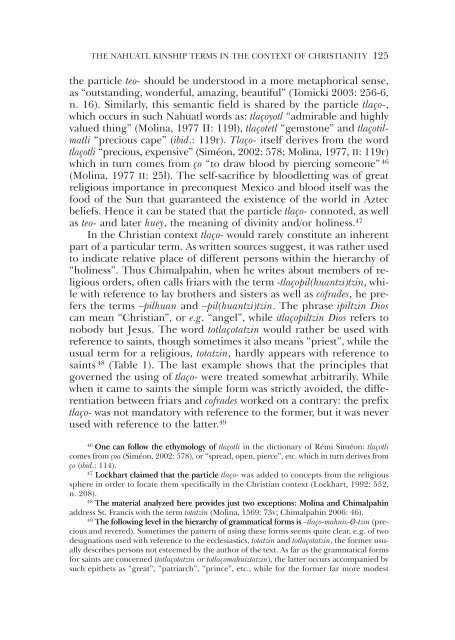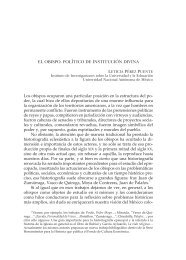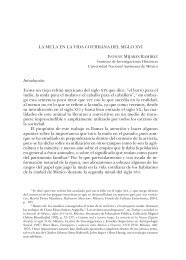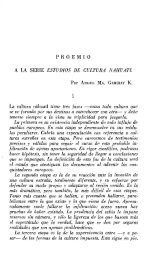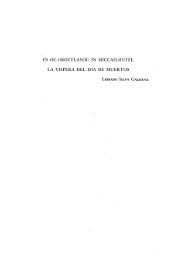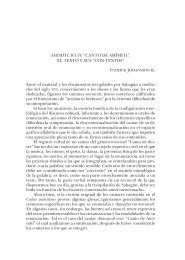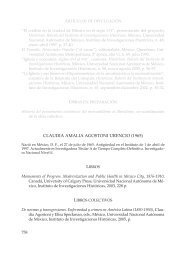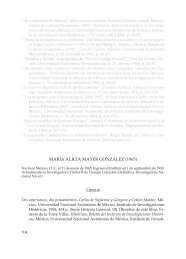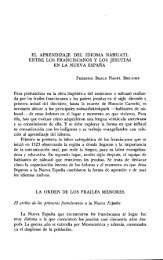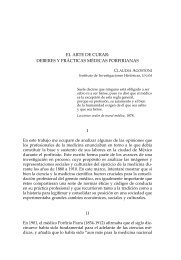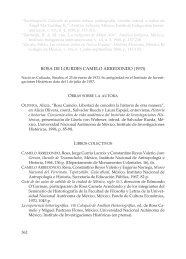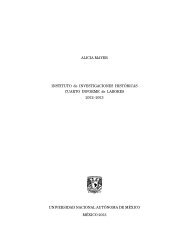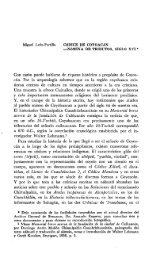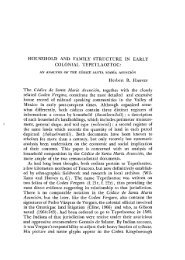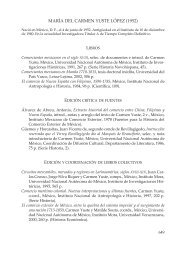“HOLY FAMILY”. THE NAHUATL KINSHIP TERMS IN THE ...
“HOLY FAMILY”. THE NAHUATL KINSHIP TERMS IN THE ...
“HOLY FAMILY”. THE NAHUATL KINSHIP TERMS IN THE ...
Create successful ePaper yourself
Turn your PDF publications into a flip-book with our unique Google optimized e-Paper software.
The Nahuatl kinship terms in the context of Christianity 125<br />
the particle teo- should be understood in a more metaphorical sense,<br />
as “outstanding, wonderful, amazing, beautiful” (Tomicki 2003: 256-6,<br />
n. 16). Similarly, this semantic field is shared by the particle tlaço-,<br />
which occurs in such Nahuatl words as: tlaçoyotl “admirable and highly<br />
valued thing” (Molina, 1977 II: 119l), tlaçotetl “gemstone” and tlaçotilmatli<br />
“precious cape” (ibid.: 119r). Tlaço- itself derives from the word<br />
tlaçotli “precious, expensive” (Siméon, 2002: 578; Molina, 1977, ii: 119r)<br />
which in turn comes from ço “to draw blood by piercing someone” 46<br />
(Molina, 1977 ii: 25l). The self-sacrifice by bloodletting was of great<br />
religious importance in preconquest Mexico and blood itself was the<br />
food of the Sun that guaranteed the existence of the world in Aztec<br />
beliefs. Hence it can be stated that the particle tlaço- connoted, as well<br />
as teo- and later huey, the meaning of divinity and/or holiness. 47<br />
In the Christian context tlaço- would rarely constitute an inherent<br />
part of a particular term. As written sources suggest, it was rather used<br />
to indicate relative place of different persons within the hierarchy of<br />
“holiness”. Thus Chimalpahin, when he writes about members of religious<br />
orders, often calls friars with the term -tlaçopil(huantzi)tzin, while<br />
with reference to lay brothers and sisters as well as cofrades, he prefers<br />
the terms –pilhuan and –pil(huantzi)tzin. The phrase ipiltzin Dios<br />
can mean “Christian”, or e.g. “angel”, while itlaçopiltzin Dios refers to<br />
nobody but Jesus. The word totlaçotatzin would rather be used with<br />
reference to saints, though sometimes it also means “priest”, while the<br />
usual term for a religious, totatzin, hardly appears with reference to<br />
saints 48 (Table 1). The last example shows that the principles that<br />
governed the using of tlaço- were treated somewhat arbitrarily. While<br />
when it came to saints the simple form was strictly avoided, the differentiation<br />
between friars and cofrades worked on a contrary: the prefix<br />
tlaço- was not mandatory with reference to the former, but it was never<br />
used with reference to the latter. 49<br />
46<br />
One can follow the ethymology of tlaçotli in the dictionary of Rémi Siméon: tlaçotli<br />
comes from çoa (Siméon, 2002: 578), or “spread, open, pierce”, etc. which in turn derives from<br />
ço (ibid.: 114).<br />
47<br />
Lockhart claimed that the particle tlaço- was added to concepts from the religious<br />
sphere in order to locate them specifically in the Christian context (Lockhart, 1992: 552,<br />
n. 208).<br />
48<br />
The material analyzed analyed here provides just two exceptions: Molina and Chimalpahin<br />
address St. Francis with the term totatzin (Molina, 1569: 73v; Chimalpahin 2006: 46).<br />
49<br />
The following level in the hierarchy of grammatical forms is<br />
The following level in the hierarchy of grammatical forms is –tlaço-mahuiz-Ø-tzin (precious<br />
and revered). Sometimes the pattern of using these forms seems quite clear, e.g. of two<br />
designations used with reference to the ecclesiastics, totatzin and totlaçotatzin, the former usually<br />
describes persons not esteemed by the author of the text. As far as the grammatical forms<br />
for saints are concerned (totlaçotatzin or totlaçomahuiztatzin), the latter occurs accompanied by<br />
such epithets as “great”, “patriarch”, “prince”, etc., while for the former far more modest


